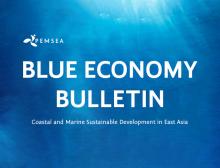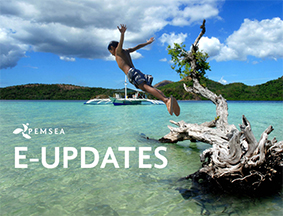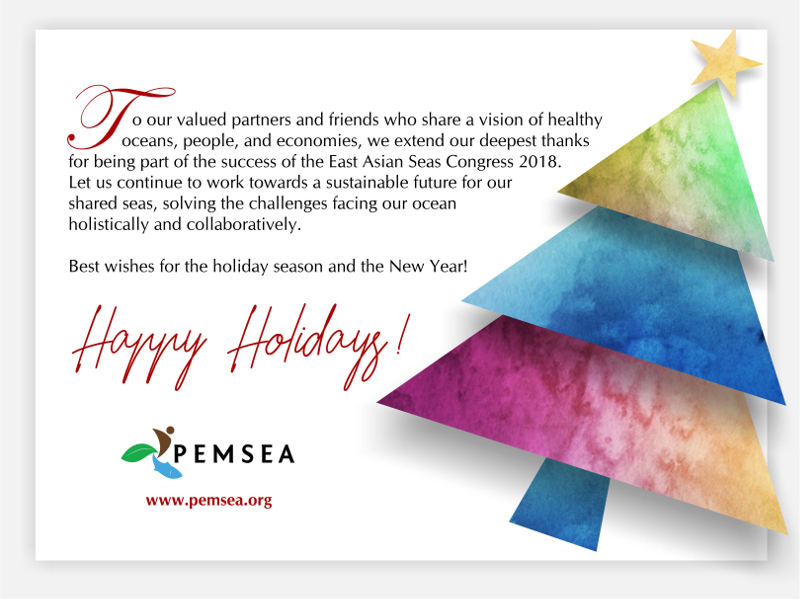
Breadcrumb
-
Blue Economy Bulletin April 2019
Welcome to PEMSEA's second Blue Economy Bulletin for 2019. This month saw the launch of MEPSEAS, an IMO project aimed at addressing the impacts of maritime shipping on Southeast Asia's biodiversity. Initiatives are taking place to address biofouling, while Maersk leads the industry in combatting climate change.
Efforts to protect biodiversity were reflected elsewhere as Indonesia created 3 new MPAs in its waters. Biodiversity in international waters could be protected through an international requirement for environmental impact assessments, and an upcoming deep-sea mining pilot in international waters will be closely monitored to evaluate its environmental impact.
Spurring more sustainable development will require an overhaul of the global financial system, which will be difficult considering many institutions are not considering trends such as climate change in their financial accounting. Another key change to spurring sustainability would be unlocking data for the use of ocean management professionals.
Follow the latest updates on blue economy and coastal sustainable development in East Asia on Facebook and Twitter. We welcome your feedback, so please let us know if there are other blue economy topics you would like to see in future newsletters and programs.
-
E-Update March 2019
Welcome to the March PEMSEA e-update. This month has seen a number of tools released to aid with coastal and ocean management, some by PEMSEA partners and some by others. Find them below, alongside a selection of the latest news regarding our shared seas. We hope you join PEMSEA as we participate in Earth Hour this Saturday. In between newsletters, follow us on Facebook and Twitter for the latest updates.
-
Blue Economy Bulletin February 2019
Welcome to PEMSEA's first Blue Economy Bulletin for 2019. Top of our stories is an article on the economic value of wastewater as explained in the in-depth Indonesia, Philippines, and Viet Nam wastewater sector reports jointly published by PEMSEA and ARCOWA. The reports are timely and relevant given the region's focus on water quality, pollution reduction, and waste management. This month we also look at two integrated coastal management (ICM) examples featured in PEMSEA's 25th anniversary publication that showcase how cities build resilience to shocks and prepare to deal with climate change and other disasters.
As encouraging sustainability is a key plank in building a blue economy, it is important to understand the challenges faced by potential green investments in obtaining private financing. However, hope can be found in how dedicated climate financing is finding new avenues of cooperation, as the GCF and GEF announce a joint mission in Lao PDR. At a local level, a proper assessment of coastal areas is necessary to implement ICM solutions. CCRES has created 15 tools to assess fisheries management, business development, and other aspects of coastal management.
Seafood is one industry where achieving sustainability is essential, and innovative solutions appear to be thriving. Technology is helping, with acoustic sensors providing a novel method to detect blast fishing, while rapid DNA analysis may allow the species of fish parts to be identified within hours. The growing insect meal industry shows potential to become a reliable food supply for aquaculture. New research reveals better data about the state of Pacific shark populations, but also that microplastic pollution damages mussel populations, threatening their survival.
Follow the latest updates on blue economy and coastal sustainable development in East Asia on Facebook and Twitter. We welcome your feedback, so please let us know if there are other blue economy topics you would like to see in future newsletters and programs.
-
E-Update January 2019
Welcome to the first e-update of 2019! Towards the end of 2018 our Sixth East Asian Seas Congress saw delegates from throughout the region and the world congregate in Iloilo City to discuss how to secure healthy and sustainable oceans, people, and economies, and how to move as one with the global ocean agenda. Many of the proceedings from that event are now available.
Officially released during the Congress was our book Local Contributions to Global Sustainable Development Agenda: Case Studies in Integrated Coastal Management in the East Asian Seas Region. This contains case studies from throughout PEMSEA's 25 years. Read how two cases have improved ecosystem health.
Following cleanup and rehabilitation efforts in Boracay, an ambitious attempt to clean Manila Bay was launched late this month by the Philippine Government, led by the Department of Environment and Natural Resources. Internationally, efforts to reduce pollution spurred the creation of the Alliance to End Plastic Waste, whose members are global companies from throughout the plastic supply chain.
The importance of ensuring ocean use is sustainable was highlighted by China's huge increase in seafood consumption during 2018. Actions in the region to tackle illegal threats to biodiversity are having an impact, as China cracks a totoaba smuggling ring, while Indonesia looks to extend its anti-IUU fishing enforcement capabilities, and the Marine Stewardship Council works on potential changes to its fisheries evaluation such as taking into account shark finning.
Research on the impact of climate change continues, with new research suggesting that as the oceans reach the end of its thermal buffering warming will increase and sea level will rise 30cm this century. Current pledges fall short of what is needed to meet the Paris Agreement. In light of the growing impact of climate change, the World Bank is increasing finance for climate resilience. Lessons can be learned from the Indonesian response to the Sunda Strait tsunami, which was carried out through pre-existing capacity. -
End of Year Highlights!
Welcome to the final PEMSEA newsletter of 2018! The past year was a momentous one for PEMSEA, and for the shared seas whose future we are working to ensure. In this edition of the newsletter, we share some of the highlights from the work of PEMSEA this year, as well as important outputs produced.
We are proud with what has been done, however, expect more next year, which will see the continuation of ongoing projects such as the implementation of the Sustainable Development Strategy for the Seas of East Asia (SDS-SEA), as well as continuing outputs from the recent East Asian Seas (EAS) Congress 2018.
Next year we hope you will continue to share our vision of healthy oceans, people, and economies. Updates can always be found on our Facebook and Twitter (@PEMSEA) accounts. Happy holidays and a happy new year!
-
Blue Economy Bulletin October 2018
Welcome to the October Blue Economy Bulletin. This is the last newsletter before the EAS Congress 2018, which takes place from 27-30 November in Iloilo City, Philippines. Next month, instead of an E-update, daily bulletins will be sent out from the EAS Congress. To those attending, we look forward to seeing you there. In conjunction with the EAS Congress, PEMSEA is releasing its 25th anniversary publication. This publication serves as a compendium of PEMSEA's integrated coastal management (ICM) activities throughout the past 25 years. Two previews of partnership hubs at the EAS Congress are included in this bulletin: one on business opportunities in the blue economy, and one on blue carbon solutions.
Both the blue economy and blue carbon are gaining increasing global attention. The Meloy Fund is seeking investment opportunities in the coastal fisheries sectors of Indonesia and the Philippines, while a study by Plymouth Marine Laboratory (PML) has found MPAs benefit a variety of economic sectors in addition to their ecological and socioeconomic benefits. Both the Meloy Fund and PML will be attending the EAS Congress 2018. The World Bank has announced a blue economy trust fund, and a framework for ocean finance was presented at the Our Ocean summit. Blue carbon is becoming increasingly important, especially given the troubling IPCC report on 1.5°C warming, although action is being taken as the GCF approved 19 new projects in developing countries and the IMO rejected attempts to soften upcoming sulfur content limits for marine fuel.
As overwhelming plastic waste flows resulted in Malaysia following China in announcing a future ban on plastic waste imports, international focus on the issue is being visited in forums such as the New Plastics Economy Global Commitment and the Platform for Accelerating the Circular Economy. The value fish and other vertebrates play in sequestering carbon in the ocean is being seen in the concept of "fish carbon". Despite this, overfishing continues to shrink fish populations, for example in Myanmar and the Philippines.
PEMSEA's thoughts go out to the thousands affected by the earthquake and tsunami in the city of Palu and nearby areas of Indonesia. Such events highlight the vulnerability of many living in coastal communities throughout the region and the world.
Follow the latest updates on blue economy and coastal sustainable development in East Asia on Facebook and Twitter (@PEMSEA). We welcome your feedback, and please let us know if there are other blue economy topics you would like to see in future newsletters and programs.
-
E-Update September 2018
Welcome to our September E-Update! There are just two months to go until our East Asian Seas (EAS) Congress 2018, which takes place from 27-30 November 2018. Exhibition registration ends this month, however online registration for individuals will continue until 30 October. One exhibition will be hosted by ACB, whom PEMSEA signed a new Letter of Cooperation with this month. In between newsletters, follow us on Facebook and Twitter (@PEMSEA) for the latest updates.
-
Blue Economy Bulletin August 2018
This August has seen a frenzy of actions at all levels to keep our rivers and coasts and oceans healthy and resilient. PEMSEA published its “Understanding Integrated Coastal Management” training course, which provides teachers and trainers the tools needed to pass on ICM knowledge. ICM knowledge in many fields will be shared at our EAS Congress 2018 this November, and we are glad to welcome Dale Galvin from Rare as a conference speaker on sustainable fisheries. ICM also benefits from innovative partnerships, and so PEMSEA has partnered with Circulate Capital to help finance solutions to the problem of marine plastic. Circulate Capital seeks to fill capital gaps and prove the investment market by financing opportunities that collect, sort, process, and manufacture using waste in countries known to contribute to ocean plastic.
Water resources have been a subject of considerable discussion this month. The World Economic Forum’s 2018 Global Risks Report predicted water-related issues would be highly impactful over the next decade, a prediction brought into stark relief by Lao PDR’s pause on all hydropower projects following last month’s dam collapse. Rivers hold great value in their resources and ecosystem services, yet these are often overlooked during development, such as in Indonesia’s Kapuas river where locals and fishermen have suffered as pollution increases. In China however, the Jiangsu Provincial Government has successfully used new laws to prosecute a company for dumping waste in the Yangtze river.
A new morphometric method to pinpoint fish origin holds promise in monitoring small-scale fisheries. These fisheries support local communities, and managing them sustainably can be crucial, as shown in the case of Ninh Hai in Viet Nam. Sustainability is also important for other economic sectors, and will be a key consideration in the reopening of the Philippine resort island of Boracay, which has been assessed to have far exceeded its tourism carrying capacity. Sustainability is economically beneficial, as the attraction of places like Boracay demonstrates the value of clean beaches.
In the fight against climate change, cities from around the world have pledged to make their buildings zero carbon by 2050. Such attempts will be aided by innovative ideas: a Philippine student has filed patents for an aircon which does not use damaging hydrofluorocarbons. In the fight against marine pollution, even imperfect solutions are helpful in facilitating change, while ensuring that all links in circular supply chains are developed.
Follow the latest updates on blue economy and coastal sustainable development in East Asia on Facebook and Twitter (@PEMSEA). We welcome your feedback, and please let us know if there are other blue economy topics you would like to see in future newsletters and programs.
-
PEMSEA E-Update May 2018
Welcome to the May edition of PEMSEA’s E-Update! During a month of important environmental occasions, we’re happy to announce that the official website for the EAS Congress 2018 is now available, providing more information about our event this November. For the International Day for Biological Diversity we cover the work of Enggar Wardani, a previous EAS Youth Forum participant who has been planting mangroves and educating school children in Indonesia. Also covered in this newsletter is the establishment of the Romblon Sustainable Development Council, a provincial body in the Philippines dedicated to overseeing ICM. In between newsletters, follow us on Facebook and Twitter (@PEMSEA) for the latest updates.


